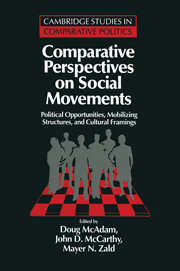 Comparative Perspectives on Social Movements
Comparative Perspectives on Social Movements Book contents
- Frontmatter
- Contents
- Biographical sketches of contributors
- Preface
- Introduction: Opportunities, mobilizing structures, and framing processes – toward a synthetic, comparative perspective on social movements
- PART I POLITICAL OPPORTUNITIES
- PART II MOBILIZING STRUCTURES
- PART III FRAMING PROCESSES
- Notes
- References
- Index
Introduction: Opportunities, mobilizing structures, and framing processes – toward a synthetic, comparative perspective on social movements
Published online by Cambridge University Press: 05 June 2012
- Frontmatter
- Contents
- Biographical sketches of contributors
- Preface
- Introduction: Opportunities, mobilizing structures, and framing processes – toward a synthetic, comparative perspective on social movements
- PART I POLITICAL OPPORTUNITIES
- PART II MOBILIZING STRUCTURES
- PART III FRAMING PROCESSES
- Notes
- References
- Index
Summary
In a widely read book published in 1960, the sociologist Daniel Bell proclaimed the “end of ideology.” As the 1960s dawned, a good many social scientists believed we had reached a stage in the development of society where ideological conflict would gradually be replaced by a more pluralistic, pragmatic consensus. Bell and his colleagues could not have been more mistaken. In the very year Bell's book was published, black students staged sit-in demonstrations throughout the American South. In turn the sit-ins revitalized both a moribund civil rights movement and the tradition of leftist activism dormant in America since the 1930s. During the ensuing decade the country was rent by urban riots, massive antiwar demonstrations, student strikes, and political assassinations. On a global level, student movements proliferated: in France, Mexico, Italy, Germany, Spain, Japan, Pakistan, and numerous other countries. In Czechoslovakia, an effort to reform and “humanize the face of communism” was brutally suppressed by Soviet forces.
In short, the 1960s witnessed a proliferation in the very kinds of social movements and revolutions that Bell had assumed were a thing of the past. The last twenty-five years have only served to underscore the poverty of Bell's argument. If anything, social movements and revolutions have, in recent decades, emerged as a common – if not always welcome – feature of the political landscape. In the 1970s Islamic fundamentalists wrest power from the Shah of Iran. The Sandinistas depose Somoza in Nicaragua. Terrorist groups in Germany and Italy step up their attacks on military installations, politicians, and symbols of “corporate hegemony.” The 1980s were witness to more of the same.
- Type
- Chapter
- Information
- Comparative Perspectives on Social MovementsPolitical Opportunities, Mobilizing Structures, and Cultural Framings, pp. 1 - 20Publisher: Cambridge University PressPrint publication year: 1996
- 264
- Cited by


